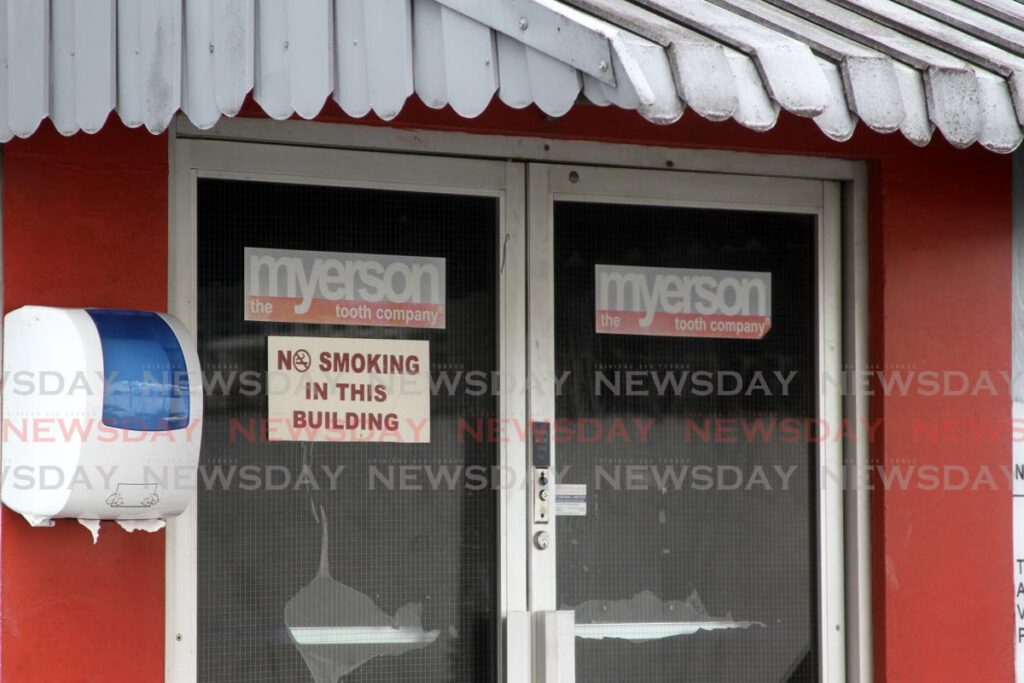Business
Ryan Hamilton-Davis
If you ask Jim Swartout, president and CEO of Myerson LLC, Trinidad and Tobago is not only a good choice when it comes to making foreign investments, it is a smart choice.
Myerson LLC, a globally recognised dental company based in Chicago, Illinois, has invested in TT through its factory on Trinity Avenue, Laventille, for the past 70 years. The hundred-plus year-old company, established in 1917, found its way to TT’s shores in the early 50s when the Myerson family came to TT on a trade mission.
Decades later, Swartout represented TT in a similar fashion at a virtual webinar hosted by the American Chamber of Commerce (Amcham) entitled – Doing business with Illinois.
The webinar is a precursor to a virtual trade mission – the first of its kind – expected to be held in January 2022. The webinar will not be the only one to be conducted in the months to come. Amcham CEO Nirad Tewarie said similar webinars were held with Canada, and is expected to be held with other states and cities where TT products could reach wider markets, and businesses in the US could benefit from several incentives.
Benefits of working with TT
From his office at the corner of Foster Avenue and Ravenswood Avenue in Chicago, Swartout said that if there were no other benefits to conducting business in TT, one benefit would be the weather.
“Here on the corner of Foster and Ravenswood, I can tell you it’s 41 degrees Fahrenheit and for my fellow Illinoians on the conference it is 90 degrees in Port of Spain. So that is one reason to do business in TT, the weather.”
As a Chicago native where later on in the year gets much colder, Swartout described the weather in TT, with its bright sunshine and cool rains, as almost perfect.
But nice weather wasn’t the only benefit that Swartout pointed out in his presentation. He highlighted the work ethic of TT citizens as well, saying that employees of Myerson LLC were hardworking, enthusiastic, patriotic and eager to learn despite the fact that TT has 22 holidays.
“I would say at Myerson we embody the potential for the full partnership between Illinois and TT. We have global marketing, customer service, corporate, all those things, in the US but the heart of the company beats in TT. That is where we have our manufacturing and as a class 2 medical device company. we have other essential functions that happen only in TT. It is our only manufacturing site,” he said.
“I really couldn’t think of a better people to work with,” Swartout added. “They have an extremely strong work ethic. When people come to work, they come to work hard. Trinis love their country and I think it carries over to the workplace. They are proud of their country and they love it and they want to work with each other. They also have thirst for knowledge. They are so eager to learn and I marvel at the people that work at Myerson, who outside of work actually go and find education wherever they can. The curiosity and the eagerness to learn is exceptional.”
Swartout added that an adjacent time zone between TT and Illinois – being only one hour apart in the first six months of the year and two hours ahead in the second six – was also a great benefit for communication when he is not in the country.
He also said freight was simple and fast.
“We use FedEx to ship from Port of Spain. It gets picked up, routed to Puerto Rico up through Memphis and then to Chicago. We would ship our goods on Friday and more often than not they show up on Monday after clearing customs and FDA clearance in Memphis.”
“The cost using air freight is as competitive as ocean freight with all the benefits of the time savings,” He added. “The carriers want to fill their planes because TT is an import economy. So they want to fill their containers as they leave TT. We export 99 per cent of what we make, and logistics and freight are part of it.”
Research officer at ExporTT Pramilla Ramdahani added that as far as location is concerned TT is also in a good spot.
“We are considered a Caribbean hub with markets in South America as well as North American markets,” she said.
“In terms of climate change we have very few disruptions because we are not in the Atlantic hurricane belt,” she added. “Over the last century we only had three hurricanes that affected TT. So it is quite safe to set up your business in TT if you are looking to get away from that belt.”
She also mentioned the Special Economic Zones Act which is before Parliament and is expected to be laid in the Senate at the end of November. She said it will join with many other incentives in the Fiscal Incentives Act, the Income Tax Act and the Corporation Tax Act, which provides tax breaks and incentives for businesses thinking of investing in TT.

“The Special Economic Zones Act is being looked at as a means of bringing all the incentives under one umbrella that would provide several incentives for participants and investors. The focus is to modernise the economic free zones to increase economic and social impact and enhance the appeal to foreign investors,” Ramdahani said.
An untapped market
A business relationship with Illinois would also be beneficial to TT businesses looking to expand beyond its shores.
Illinois, with a population of over 12 million, has been described as the fifth largest economy in the US by GDP and one of the most diversified economies in the world. Chicago, its largest city, has a population of over two million and is home to many of the US’ largest companies including Abbott Laboratories, Allstate, Baxter International, Kraft Heinz, Motorola, United Airlines and Walgreen’s.
In 2019 its gross state product stood at US$782 billion.
Illinois has more than a million registered and authorised domestic and foreign business entities, according to Irene Lyons, general counsel at Illinois Secretary of State.
“There are about 400,000 corporations, 100,000 non-profit corporations and there are over 506,000 limited liability companies.”
She said the trend in Illinois is to start a limited liability company, because the fees for registration are lower and seems to be more economical.
She added that the tax rate was one tenth of one per cent of the corporation’s capital and has a cap of about US$2 million.
For a foreign corporation to conduct business in Illinois, it must qualify by getting authorisation through the secretary of state’s Department of Business Services.
“Generally foreign companies can transact the same kind of business as Illinois corporation they may not have certain fiduciary capacities and they may not transact business in banking or insurance. So the provisions of the Business Corporations’ Act apply to all foreign corporations and they enjoy the same rights and privileges as Illinois corporations and are subject to comparable fees and restrictions, penalties and liabilities,” she said.
In general, the state’s industrial outputs are inclusive of machinery manufacturing, food processing, electrical equipment manufacturing, chemical products, publishing, fabricated metal products and transportation equipment.
According to industry research website Ibis World, Illinois’ top sectors include real estate, rental and leasing, manufacturing, finance and insurance, professional, scientific and technical services and wholesale trade.

In a conversation with Business Day after the webinar, Tewarie expressed a hope that local business owners would see the value of connecting with Illinois and its markets. He said states such as Illinois and other states in the US Midwest are for TT businesses relatively untapped.
“Chicago and Illinois are gateways to the US,” he said. “We tend not to understand how the US market is broken up. There are many sub-markets and the mid west sub market is one of the largest.”
“On the other hand the Caribbean is automatically more attractive to some states because of the weather and the outlook. If we continue to develop the market we could bring the flavour of the Caribbean to them and it would be attractive, especially in the cold months.”
More trade missions to come
Illinois is not the only state that Amcham hopes to send trade missions to. Tewarie told Business Day Amcham is currently looking at the feasibility of conducting a similar trade mission to the city of Atlanta. Earlier this year, they reached out to Canada with similar offerings of a robust trade relationship.
“This is one way that the private sector is trying to help bring in foreign investment,” Tewarie said. “It is supported by government through the Export Booster Initiative. I think it is a good example of private companies working with the public sector.”
In her presentation at the webinar, Trade and Industry Minister Paula Gopee-Scoon said the relationship between TT and the US has always been constant and highly regarded, as the US is one of the largest importers of TT products. She said a fruitful business relationship is beneficial to both countries and trade missions contribute to strengthening it.
“In 2020, TT exported over TT$14 billion to the US, reflecting a trade surplus of almost TT$ 1.9 billion,” she said.
Noting that the exports heading north were dominated by energy and energy-related products, she said exports to the US are becoming more diversified.
“According to a recent Caribbean Basin Economic Recovery Act (CBERA) report, TT exports to the US have become more diversified. We have begun to export a greater number of products to the US and became less reliant on exports of just a few products. For the Illinois market, we have earmarked specific sectors with export potential including the creative industries, food and beverage, construction goods, printing and packaging, chemicals and technology-related products.”
